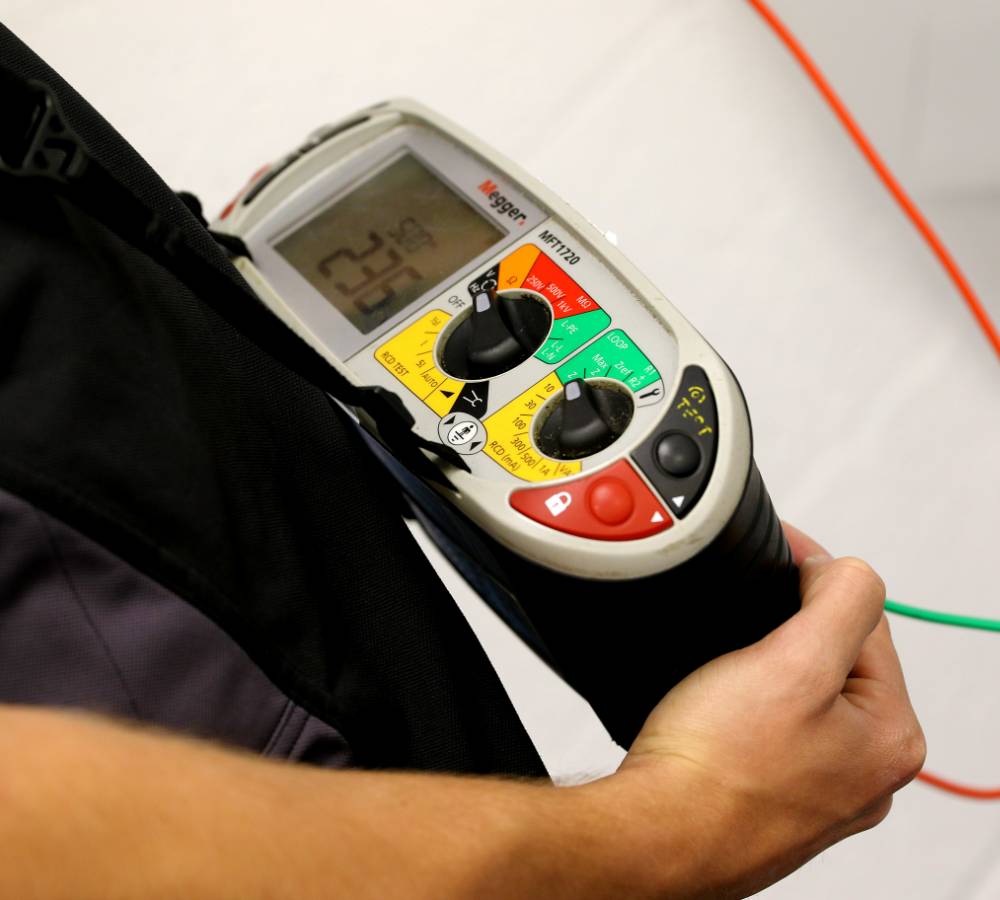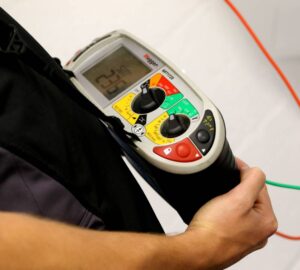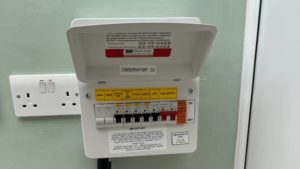If you own or manage a commercial property in the UK, you’ve likely heard of fixed wire testing – also known as Electrical Installation Condition Reporting (EICR). But is it a legal requirement?
In this guide, we’ll break down your responsibilities under UK law, how often fixed wire testing should be carried out, and how to stay compliant as a business or landlord anywhere in England.
What Is Fixed Wire Testing?
Fixed wire testing refers to the inspection and testing of the permanent electrical systems in a building – including distribution boards, lighting circuits, sockets, and hardwired equipment. It is performed under the BS 7671 IET Wiring Regulations and results in a detailed Electrical Installation Condition Report (EICR).
Is Fixed Wire Testing a Legal Requirement in the UK?
Yes — while the law does not specifically name “fixed wire testing,” UK legislation requires businesses and commercial landlords to maintain electrical systems in a safe condition. This includes:
- Health and Safety at Work Act 1974 – requires employers to ensure the health and safety of employees and visitors.
- Electricity at Work Regulations 1989 – mandates that all electrical systems must be maintained in a condition that prevents danger.
- Provision and Use of Work Equipment Regulations (PUWER) – applies to equipment, including electrical systems, used in the workplace.
The most recognised way to demonstrate compliance with these laws is through periodic fixed wire testing and a valid EICR certificate issued by a qualified electrician.
How Often Should Fixed Wire Testing Be Done?
The recommended frequency of fixed wire testing depends on the type of premises. The general guide is:
- Offices and Retail Units: Every 5 years
- Industrial Premises: Every 3 years
- Restaurants and Hotels: Every 5 years
- Educational Institutions: Every 5 years (with annual checks)
- Public Buildings (e.g. libraries): Every 5 years
Some insurers, landlords, or local authorities may also require more frequent testing depending on the building use.
What Happens During Fixed Wire Testing?
During a fixed wire test, a qualified commercial electrician will:
- Visually inspect the entire fixed electrical system
- Perform circuit testing using calibrated equipment
- Identify overloaded circuits, potential fire hazards or electric shock risks
- Test earthing and bonding arrangements
- Issue a detailed EICR report, highlighting any issues with a coding system (C1, C2, FI)
What If Your Business Fails the Test?
If the report is marked as “Unsatisfactory”, the issues must be rectified by a qualified electrician. Common faults include:
- Inadequate earthing or bonding
- Overloaded circuits
- Damaged wiring or sockets
- Lack of RCD protection
Once the issues are resolved, a satisfactory certificate can be issued for your records, insurance provider, and health & safety file.
Who Is Responsible for Electrical Compliance?
The responsibility for electrical safety lies with the duty holder, which is typically:
- The business owner
- The facilities or building manager
- The commercial landlord (if you’re leasing space)
Failing to carry out proper electrical maintenance can lead to:
- Fines or prosecution under the Health and Safety at Work Act
- Invalidated business insurance
- Increased risk of fire, electric shock or workplace injury
Emergency Lighting Testing – Another Legal Obligation
While you’re reviewing your compliance, don’t forget about emergency lighting testing. This is also a legal requirement for many commercial properties under the Regulatory Reform (Fire Safety) Order 2005.
Monthly function tests and annual 3-hour discharge tests are typically required — and records must be kept up to date.
We Carry Out Commercial EICRs Across England
At Martin Cook Electrical, we carry out fixed wire testing, emergency lighting testing, and commercial EICRs for businesses, landlords, and public sector organisations throughout England.
All inspections are carried out by NICEIC-approved commercial electricians, and we work with minimal disruption to your business operations.
Get in touch today to schedule your electrical compliance inspection.

Get in touch with the Martin Cook Electrical Services team today and request your free, no-obligation quotation. Have any questions? We’re here to help with any of your queries.
FAQs – Fixed Wire Testing & Commercial Compliance
Is fixed wire testing required by law?
Yes, commercial properties must maintain safe electrical systems under UK health and safety law. Regular fixed wire testing is the best way to demonstrate compliance.
How often should businesses get an EICR?
It depends on the property type, but most commercial buildings should be tested every 3 to 5 years.
Do landlords need to do fixed wire testing?
Yes, commercial landlords must ensure that fixed electrical systems are safe and properly maintained. An EICR is the recommended method.
What is the penalty for not having an EICR?
Penalties include enforcement notices, fines, and potential prosecution under health and safety regulations. You may also invalidate your insurance cover.
Can fixed wire testing be done during working hours?
Yes, we offer flexible scheduling to minimise disruption, including early mornings, evenings and weekends if needed.




